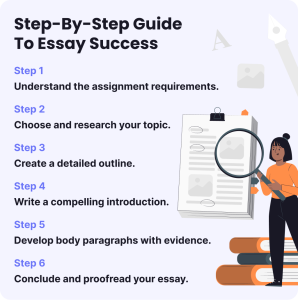- Begin by analyzing the question thoroughly.
- Clearly define your argument.
- Support your argument with evidence, logical reasoning, and scholarly references.
- Structure your essay in a coherent and logical manner.
- Ensure your writing is clear and concise.
- Properly cite all sources and evidence used.
Growing up, my teachers told me that writing would get a lot more difficult in college.
Misspell a word? Forget to cite a source? “We might let that slide,” they said, “but your
professors will bring down the hammer.”
But here’s the thing: Threatening students with strict grading doesn’t actually teach them
how to do an essay. And teaching students how to write after they make mistakes only ensures that they’ll start college playing catch-up for things they never learned.
In this article, I’ll help you avoid such a twisted, unfair scenario. Together, let’s navigate the intricacies of essay writing.
Table of Contents
- Basic Steps to Write an Essay
- The Process of Essay Writing
- What Makes an Essay Tick
- If You Still Need Help, Tap in an Expert
- Frequently Asked Questions
First, the Basic Steps to Write an Essay
We’ll eventually go over the finer details of how to write a good essay. But for now, let’s
discuss what an essay needs to have.
Did you know “essay” comes from French? According to the Online Etymological Dictionary, its original meaning referred to “trial,” “attempt,” or – in verb form –“to test the mettle of.” In other words, it’s an argument through which the essayist tries to prove
that something is true. As such, it must have these three things:
-
Thesis Statement:
Writing an essay becomes easier when you can explain, in one or two sentences, what it’s all about. That’s your thesis statement. It goes at the beginning of your paper, and it tells the reader what you’re about to argue. For you, the writer, it also provides a fixed point that you can keep referring back to as you develop your points.
-
Body Paragraphs:
I’ve graded essays without any structure, and they’re always a confused mess. Don’t give your teacher a giant block of text; separate your thoughts into organized paragraphs, each starting with its own topic sentence. Essay writing this way is a much more coherent process, for your sake, and it allows the reader to follow your argument as well.
-
Cited Sources:
No good teacher teaches students how to make an essay without making it clear that plagiarism – pretending someone else’s ideas are your own – is unacceptable.
That said, any good student knows that it’s important, when writing essays, to use expert research and ideas to support their own claims. Therefore, you must include detailed citations that explain where you got your information.

The Process of Essay Writing
Now you know what your essay needs to have, but what do you actually do once you’ve
opened that blank Word document and, after staring at it for five minutes, decide to start
working?
Here’s a summary of how to write an essay in five steps.
-
Brainstorm:
How do you write an essay without knowing what to write about? Don’t assume you’ll “figure it out” along the way. Write down your ideas, good and bad, and think about how you can connect them and flesh them out.
-
Conduct Research:
Do you know how to write an essay without any background knowledge? I certainly don’t. Once you’ve brainstormed ideas, make sure facts and sources are on your side. Before you do any essay writing, find them.
-
Create Your Outline:
How do you write an essay without knowing where it’ll take you? You don’t have to plan out every sentence, but organize the big ideas first. Convert your main claims into topic sentences and determine where you can put the evidence you’ve just found.
-
Write:
At this point, you just need to do it. Set a daily target, like a specific word count, and take breaks when you slow down. If you need help writing an essay at this point, you’ll have your brainstormed ideas, research, and outline already on hand. See how it all comes together?
-
Revise, Edit, and Proofread:
Editing your essay is as important as actually writing it. Don’t hesitate to modify your ideas or the order in which you express them. It sounds obvious, but check for spelling and grammatical errors. At this point, you can even hire outside help, like a law essay writing service, to double-check for you. As I tell students, don’t miss “dumb points” on things that are easily fixable!

Part Two: What Makes an Essay Tick
A well-written essay follows a clear and logical structure, starting with an introduction, followed by body paragraphs, and ending with a conclusion. Each paragraph should center around one main idea or theme, and the transitions between paragraphs should flow smoothly.
I hope it’s become obvious that writing an essay in school is not the time to show off your
experimental, stream-of-consciousness writing style. Successful essay writing comes down to clarity: making original claims and convincing the reader to agree with them.
You can’t do either of those things without the bones of an essay, or its structural components, like those we’ve discussed so far. But what do you do once everyone in class learns to write a thesis statement? How do you stand out?We’ve gone over the bones. Now, let’s talk about how to write essays with muscle.
| Tip | Description |
|---|---|
| 1. Analyze Your Prompts Carefully | Break down the essay prompt to ensure every part is addressed and your response is focused. Questioning assumptions is a sign of critical thinking. |
| 2. Write Confidently | Keep your writing simple and clear. Avoid complex words and passive voice. Professors prefer concise, confident arguments. |
| 3. Establish Tone | Your word choices set the tone of your writing. Study classic essays to learn effective tone, and consider using online services like WriteMyEssayToday. |
| 4. Know Your Audience | Tailor your argument to your audience. Formal assignments require formal language and a clear understanding of what your audience values. |
| 5. Master Rhetorical Appeals | Use ethos, pathos, and logos to build trust and authority. Explore additional rhetorical appeals to strengthen your argument. |
| 6. Do Not Write Your Essay in One Sitting | Spread out your writing process to allow time for argument development and editing. Avoid cramming essays at the last minute. |
| 7. Research Things That Seem Irrelevant | Conduct tangential research to discover unique ideas and stand out to your professor, but ensure it's still relevant to your essay. |
| 8. Write an Interesting Conclusion | Use the conclusion to reinforce your thesis, discuss the broader implications, and add a rhetorical flourish to leave a lasting impression. |
1. Analyze Your Prompts Carefully
Most of your professors’ rubrics will ask students to demonstrate critical thinking in their essays. What students often don’t realize is that their first opportunity to do so is in the essay prompt itself.
I give students high marks for deconstructing my prompts, questioning their inherent assumptions, and even discussing what their words mean. These things prove to me that they’re reading carefully and thinking creatively. Furthermore, students who gloss over essay prompts either fail to answer every part of them or write irrelevant answers. Again, I call these “dumb points.”
When you read your essay questions carefully – make it part of your brainstorming session! – you ensure not just that your response will be original but also focused. In this case, questioning everything like Socrates, or one of his philosophy-majoring admirers, is actually an asset.
2. Write Confidently
Everyone has their own writing style, and that’s worth celebrating. However, students who need help writing an essay often don’t have a problem with organizing ideas nor citing sources. More frequently, they need to improve their actual sentences. (And that’s ok!)
Whether it’s because you’re trying to sound impressive or just have less writing experience, your professors won’t be convinced by anyone whose prose is hard to follow.
So here’s my advice: Simple is better. Simple words are better than unnecessarily complex words. Simple statements are better than unnecessarily (“flowery”) statements. When possible, always use active voice instead of passive voice.
In other words, don’t obscure your argument; just come out and say it! Your professors don’t care if you have an impressive vocabulary so much as they want you to show critical thinking and reasonable judgment. When you write confidently, you get your points across more clearly and convincingly.
3. Establish Tone
Sometimes students struggle with managing tone because it’s harder to demonstrate. However, it’s important to understand that your word choices contribute to the overall “mood” of your writing, whether it’s angry, optimistic, or downright sarcastic.
What’s exciting about writing essays, as opposed to a rigid scientific paper, is that you can often choose the tone for your argument. My advice to students is twofold. First, read and learn from classic essays that utilize tone effectively, like Jonathan Swift’s darkly satirical A Modest Proposal or Mark Twain’s humorous lesson How to Tell a Story.
Second, try getting help with writing an essay using an online service. Platforms like WriteMyEssayToday are useful because you can hire an expert writer to follow the specific requirements of your assignments. Alongside its 60-day money-back guarantee and 10-day window for requesting revisions, I recommend WriteMyEssayToday because I trust its experts to get the job done efficiently.
4. Know Your Audience
If you interviewed for a job at a law firm, would you show up in a Hawaiian shirt and shorts? Similarly, when you turn in a final exam for English class, do you think your professor will want you to start your essay by saying, “I feel like Charles Dickens was the best author because his books are really cool”?
If your goal is to write convincingly, you have to understand your readers. If you’re writing for children, for example, it’s ok to oversimplify your language. However, formal assignments for formal audiences require formal language.
When it comes to essay writing in particular, you should tailor your argument towards what will best convince your readers, be they teachers, scientists, or the general public, that you’re correct. Demonstrating knowledge of your audience is implicitly a way of establishing trust, but it’s also a sign that you understand what they care about.
5. Master Rhetorical Appeals
When it comes to argumentative writing, establishing trust is also about establishing
authority by using different modes of persuasion.
You may already have learned the Big Three in school. Ethos is about showing your own expertise so that readers will take you seriously; if I were writing an article about education, I would mention that I’m a teacher with extensive experience in the field.
Pathos is about appealing to your readers’ emotions; think of those commercials from animal rights organizations that show wide-eyed dogs over sad music. Finally, logos is about persuading your readers with evidence and logic; every time you cite a research paper, for example, you’re using logos to advance your argument.
But did you know there are more rhetorical appeals at your disposal? A lot more, actually. Like, here’s a list from the South Carolina Department of Education. Learn them, practice them, and weave them together in your essays!
6. Do Not Write Your Entire Essay in One Sitting
We’ve all had to cram an assignment. Sometimes, it just happens. However, if you can help it, do not cram an essay. It simply will not turn out as well.
Arguments need time to develop, and so does the editing process. Trying to work magic the night before a deadline only ensures that your essay will be less organized, under-researched, and less well argued. My best writing moments often come the day after I hit my daily word count, because that’s when I realize, with fresher eyes, in which ways I can improve what I’ve written.
I know it’s hard; I also had a million other things going on in high school and college. However, it will help you tremendously, in the short and long runs, to pace yourself.
7. Research Things That Seem Irrelevant
Remember when I said analyzing prompts is a good way to show originality? Well, so is doing what you might call tangential research.
When you don’t use the exact same, predictable sources as your peers, you will stand out to teachers who have to grade dozens of papers, often back to back, and who (cough, cough) get a little tired of overly similar, repetitive analyses. When you do more background reading than seems necessary, you’ll discover new, creative things to write about.
Tread carefully with this one, as you don’t want to actually write about irrelevant things. However, if you can thread the needle, learning material or even taking classes that aren’t “in the right field” can turn out to be especially impactful.
8. Write an Interesting Conclusion
It’s not students’ fault that their conclusion paragraphs tend to be a bit boring. After all, they’re often taught that conclusions are just for restating their thesis statement, even verbatim, and summarizing the argument they’ve just made.
However, a strong conclusion is a great way to explain why your essay should actually matter; we teachers call this the “so what?” factor. Yes, you should reference your thesis statement, the crux of your argument.
But here’s also your chance to discuss the implications of your research, make broader statements about the field you’re in, and even use a little rhetorical flourish just to polish off your essay. My advice to students is not to fixate on their conclusions, but don’t treat them as an afterthought either.
If You Still Need Help, Tap in an Expert
The internet is just amazing. Who could have predicted thirty years ago that students would eventually be able to place a custom order essay online?
Writing services are an excellent way to find an expert who can meet your project requirements, including deadlines, formatting standards, and numbers of sources. Rather than undermine learning, I argue that these platforms support education by empowering students to consult with a writer or editor who knows what they’re doing, and who can teach with their example.
If I wanted someone else to write my essay for me, I would use WriteMyEssayToday. All you have to do is tell them about your assignment – the more detail, the better – and place your order. Within minutes, you’ll hear back from a graduate-level expert who’s happy to cater to your needs. While I’m not a student anymore, I know they’ve helped thousands get their grades up, stand out in class, and ease the stress of high school- and college-level workloads.

Frequently Asked Questions
What’s the best way to write an essay?
In fiction, many writers consider themselves “pantsers”; they sit down and start writing “by the seat of their pants” with no plan. However, essays are different. Refer back to the five-step process described above. Taking the time to brainstorm and research before writing will prevent you from running into dead ends later.
When will I know how to write an essay without help?
Argumentative writing is all about practice. Your first college essay will probably feel like nonsense, and that’s ok. Don’t panic, but do put effort into developing your style and getting comfortable with the research process. More than anything, to quote William Faulkner, “Read, read, read. Read everything – trash, classics, good and bad, and see how they do it.”
I’m not fluent in English. How can my essays get better?
First of all, learning how to write an essay in English as an ESL student is impressive! However, my advice is to worry less about perfecting your English and focus more on your argumentative skills. Professors often know which students are writing in their second language and will usually forgive occasional grammatical errors. When it comes to grading, showing critical thinking and conducting research are more important!
When and why should I hire an essay writing service?
If you’re still struggling, perhaps enough to Google, “How do I write an essay,” don’t panic. Before the internet, you would have been on your own. Nowadays, you can even hire a scholarship essay writing service to give you a helping hand. Once again, I recommend WriteMyEssayToday; it’s easy, affordable, and gives highly personalized support to students who need an expert to write their paper for them.
-
Online Etymology Dictionary:
https://www.etymonline.com/word/essay
-
Purdue University Online Writing Lab – Active Versus Passive Voice:
https://owl.purdue.edu
-
Jonathan Swift’s
A Modest Proposal
– Full Text and Analysis:
https://www.owleyes.org
-
Mark
Twain’s
https://twain.lib.virginia.edu
-
South Carolina Department of Education – Rhetorical Devices Spreadsheet:
https://ed.sc.gov



